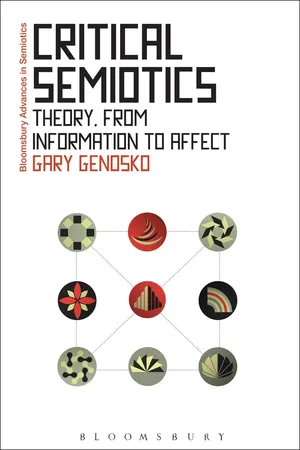
- 200 pages
- English
- PDF
- Available on iOS & Android
About this book
Critical Semiotics provides long overdue answers to questions at the junction of information, meaning and 'affect'. The affective turn in cultural studies has received much attention: a focus on the pre-individual bodily forces, linked to automatic responses, which augment or diminish the body's capacity to act or engage with others. In a world dominated by information, how do things that seem to have diminished meaning or even no meaning still have so much power to affect us, or to carry on our ability to affect the world? Linguistics and semiotics have been accused of being adrift from the affective turn and not accounting for these visceral forces beneath or generally other from conscious knowing. In this book, Gary Genosko delivers a detailed refutation, with analyses of specific contributions to critical semiotic approaches to meaning and signification. People want to understand how other people are moved and to understand embodied social actions, feelings and passions at the same time as understanding how this takes place. Semiotics must make the affective turn.
Frequently asked questions
- Essential is ideal for learners and professionals who enjoy exploring a wide range of subjects. Access the Essential Library with 800,000+ trusted titles and best-sellers across business, personal growth, and the humanities. Includes unlimited reading time and Standard Read Aloud voice.
- Complete: Perfect for advanced learners and researchers needing full, unrestricted access. Unlock 1.4M+ books across hundreds of subjects, including academic and specialized titles. The Complete Plan also includes advanced features like Premium Read Aloud and Research Assistant.
Please note we cannot support devices running on iOS 13 and Android 7 or earlier. Learn more about using the app.
Information

Table of contents
- Cover
- Contents
- Introduction
- 1 From Information Theory to Félix Guattari’s A-signifying Semiotics
- 2 Jean Baudrillard’s Anti-semiology
- 3 Delineating Info-commodities in the Age of Semiocapitalism
- 4 Michel Foucault’s Special Semiotic Characters: Obstacle-signs
- 5 Jean-François Lyotard’s Tensor Signs and the Passage to Affect
- 6 A Toolbox for Critical Semiotics
- Conclusion
- References
- Index